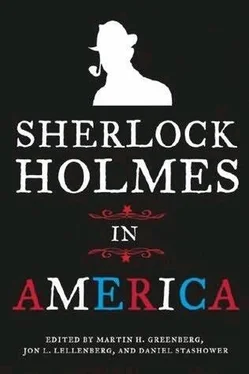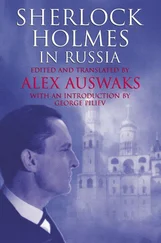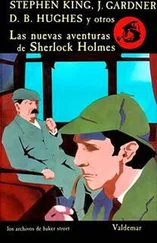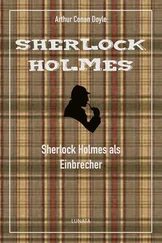“What was even more interesting than his death, however, was what was discovered about Mr. Chadwick several weeks later.”
Holmes smiled, and turned to me. “Chadwick was a talented man, Watson. He dies in October, stabbed by a young woman who is residing with him, yet continues to be newsworthy in November.” He turned back to Battle. “This is proving irresistible. Pray go on!”
“The short of it, Mr. Holmes, is that after his death a safe was found built into the wall of his bedroom. You will recall, of course, the gentleman and the young lady you saw with Chadwick, the night we attended the opera? The gentleman, Henry Ogden Slade, died barely a month after we saw him, and his young ward was left nothing whatever in his will. But a much more recent will was found in the safe in Chadwick’s bedroom, and it left everything to the girl, whom Slade acknowledged as his daughter.”
“The implication being that Chadwick somehow engineered his friend’s death, and meant to take control of his fortune? A good friend, indeed. Well, it would not surprise me, when you remember that you and I deprived Mr. Chadwick of a very large portion of his income.”
Battle shook his head. “I had nothing whatever to do with it, Mr. Holmes, which you well know. The credit is entirely yours, and your methods, although definitely unorthodox, were completely effective. A month after you left New York, I was summoned by the chief of police himself, and told that new testimony had been provided by several people, proving that I had been framed as I had claimed all along, and that I could have my old position back, if I wanted it. By that time, of course, I had received your letter, telling me what you had done.”
Holmes laughed, clearly pleased with himself. “Yes, it was an opportunity that I simply could not resist. As I think I have mentioned to you, Watson, I have often thought that I would have been a highly successful criminal, had I been so inclined. And I could not possibly indulge myself similarly in London, of course-Scotland Yard would be less than amused if I took to ‘second-story work’ here-but in New York, who was to know? Besides,” he said, raising his glass in the direction of the smiling Mrs. Battle, “the cause, in this case, was extraordinarily worthy.
“And what of you, Battle?” said Holmes. “What is in store for you on the police force? Is all forgiven?”
“More than forgiven. There are changes taking place, just as I had hoped, and shortly before Frances and I were wed, I was named an assistant to the new Commissioner of Police. You have heard of Theodore Roosevelt?”
“I have, indeed. A very good man.”
“As good as they come, and as incorruptible. He is the new broom that will sweep all New York clean.”
Rising to his feet, he raised his glass once more. “Another toast to you, then, Mr. Holmes. My cup runneth over, thanks to you.”
We all rose, then. “My blushes, Watson.” Holmes smiled, after we had drunk in his honour. “And now I think that we should all adjourn to Simpson’s for dinner. I can think of nothing more satisfying on a cold winter’s night than enjoying some good British beef with some excellent American friends.”
THE SEVEN WALNUTS by Daniel Stashower
Daniel Stashower is the Edgar-winning author of Teller of Tales: The Life of Arthur Conan Doyle and a coeditor of Arthur Conan Doyle: A Life in Letters . He is also the author of The Beautiful Cigar Girl: Mary Rogers, Edgar Allan Poe and the Invention of Murder , as well as five mystery novels, the most recent of which is The Houdini Specter . His short stories have appeared in numerous anthologies, including The Best American Mystery Stories and The World’s Finest Mystery and Best American Mystery Stories and The World’s Finest Mystery and Crime Stories. His work has also appeared in newspapers and magazines including the New York Times , the Washington Post , Smithsonian Magazine , National Geographic Traveler , and American History .

We have had some dramatic entrances and exits upon our small stage on East 69 thStreet, but I cannot recollect anything more startling and distasteful than the sudden appearance of Mr. Gideon Patrell, the celebrated sideshow entrepreneur. It was a brisk October morning in 1898 when Mr. Patrell presented himself at my mother’s kitchen table and, after submitting his mouth to a thorough examination, promptly cleared his throat and began to regurgitate a handful of walnuts, summoning them from the depths of his stomach, one by one.
Mr. Patrell arrived at this singular moment by slow degrees. A tall, rail-thin gentleman of elegant bearing and impeccable wardrobe, he had arranged to join us for breakfast so that he might discuss the possibility of engaging the services of my brother, Harry Houdini.
Harry was all of twenty-four years old at the time; I had just turned twenty-two. Professionally, my brother had hit the skids. Try as he might-and no one ever tried harder-he couldn’t quite manage to break out of the small time. Whatever small reputation he had rested entirely on his value as a novelty act. He spent weeks at a stretch working various odd turns in traveling circuses and midway tents, sleeping in swinging hammocks on carnival wagons and eating campfire meals at railway sidings. It was a life we both knew all too well. Harry and I had done an act together from the time we were kids, but of course that had changed five years earlier when he married Bess. From that day forward, she became his partner onstage and off, and I handled the booking and backstage work. To speak plainly, my duties as Harry’s advance man were not terribly rigorous. In later years the theatrical world would unite in a roaring clamor for his services; in those days, the call seldom rose above a dull murmur. The note I had received from Mr. Patrell, mentioning a sudden vacancy in his program, was our first prospect of employment in several weeks.
I had arrived at my mother’s flat early that morning. In those days I fancied myself as something of a man about town, and kept a room at Mrs. Arthur’s boardinghouse several blocks away, so as to be free to enjoy the lively and vigorous social life befitting an eligible young bachelor in New York City. In point of fact, my social life was largely confined to solitary walks in the park and reading books at the public library. I lived in hope, however.
Harry continued to live at home even after his marriage to Bess, an arrangement that appealed not only to his all-encompassing sense of devotion to our mother but also to his frugal nature. Harry and Bess were already seated at the breakfast table when I arrived. Mother stood at the stove, as always, busying herself with a pot of oatmeal.
“Sit,” she said as I came through the door. “I’ll get you something to eat. You look thin.”
“Good morning, Dash,” said my sister-in-law. “Is that a new tie? It’s very spruce.”
“Not exactly new, Bess,” I said. “They made me a deal at Scott’s bazaar.” I fingered the wide pukka silk tie at my throat, which, if I had unbuttoned the jacket of my double-breasted windowpane suit, would have displayed a grease stain left by the previous owner. “I was hoping to make a good impression on Mr. Patrell.”
I turned to my brother. “Good morning, Harry,” I said. He scowled and did not look up from buttering a piece of brown toast.
I looked back at Bess. “What’s the matter with him?”
“He’s sulking,” she said. “He doesn’t want to go back to the Ten-in-One.”
Читать дальше













